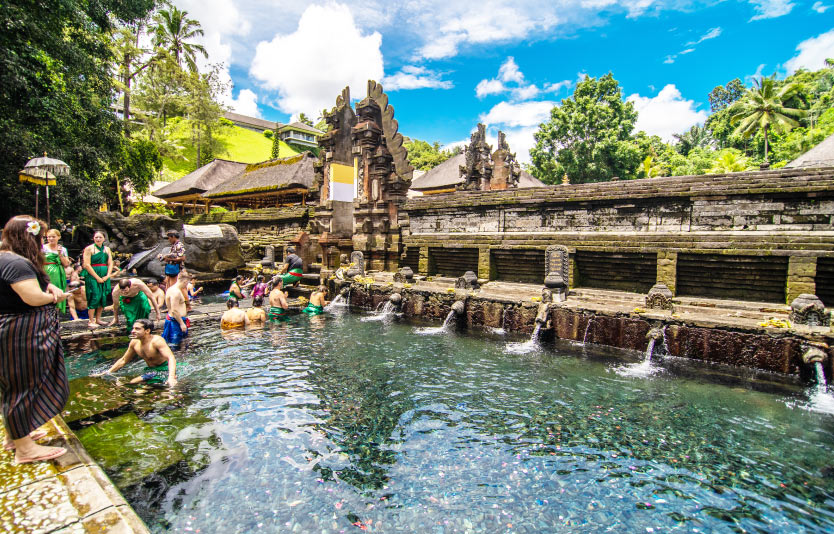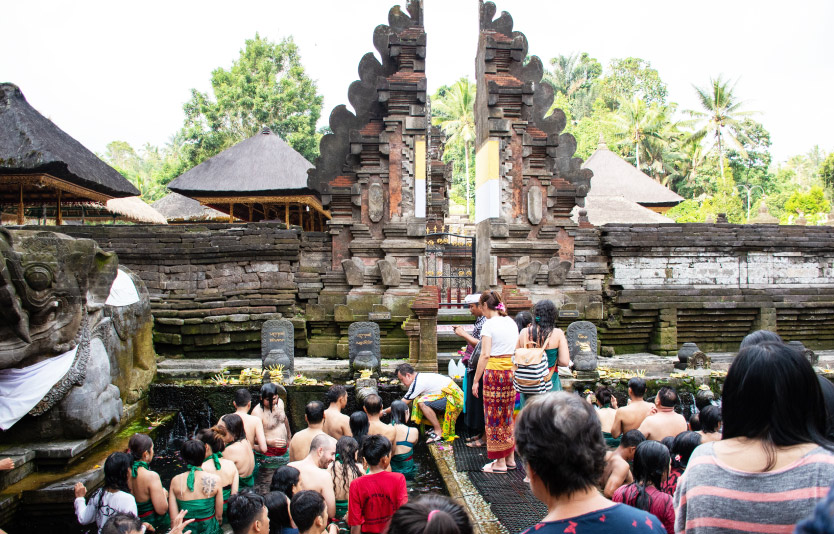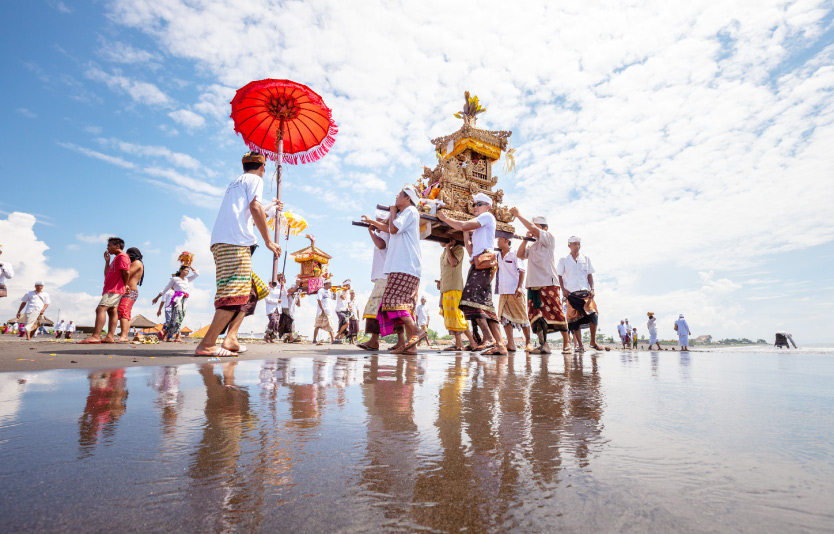Discovering Bali's Sacred Waters: Your Guide to the Holy Water Temple Bali
June 19, 2025
Nestled in the lush hills of Tampaksiring, about 15 minutes from Ubud, lies one of Bali's most sacred and spiritually significant sites—Tirta Empul, the most famous holy water temple Bali has to offer. This ancient temple, dating back to 962 AD during the Warmadewa dynasty, draws thousands of visitors each year who come to experience its legendary purification rituals and connect with centuries-old Balinese Hindu traditions.
The name "Tirta Empul" translates to "holy spring" in Balinese, perfectly capturing the essence of this remarkable site. For over a thousand years, Balinese worshippers have been drawn to this temple, believing its sacred spring was created by the god Indra and possesses powerful healing properties. Today, this tradition continues almost unchanged, making it one of the most authentic spiritual experiences you can have in Bali.

Holy Water Temple Bali
The Legend Behind the Holy Spring Temple Bali
According to ancient Balinese legend, the holy spring temple Bali was born from divine intervention. The story tells of the god Indra creating the spring to revive his troops, imbuing the waters with curative and purifying properties that continue to attract believers and curious travelers alike. This mythical origin adds a layer of mystique to your visit, transforming a simple temple tour into a journey through Bali's rich spiritual heritage.
The temple is dedicated to Vishnu, the Hindu god of water, and serves as a manifestation of Ida Sang Hyang Widhi Wasa, the supreme divine consciousness in Balinese Hinduism. This spiritual significance makes Tirta Empul not just a tourist attraction, but a living, breathing center of faith and devotion.
Exploring the Temple Complex
The Tirta Empul complex is thoughtfully divided into three distinct areas, each serving a specific spiritual purpose:
Jaba Pura (Front Yard) Your journey begins in the outer courtyard, where you'll find the entrance gates and initial temple structures. This welcoming area often hosts ceremonies and markets during temple festivals, giving you a glimpse into the vibrant community life that surrounds this sacred space.
Jaba Tengah (Central Yard) The heart of the temple experience lies in the central courtyard, home to the famous purification pools. Here you'll find two large rectangular pools filled with crystal-clear spring water, fed by 30 ornately carved stone fountains. Each fountain serves a different purpose in the purification ritual, and the sight of devotees moving from spout to spout in prayer is both moving and mesmerizing.
Jeroan (Inner Yard) The innermost sanctum provides a space for quiet prayer and meditation. This sacred area houses several shrines and offers visitors a moment of solitude and reflection away from the busier purification pools.
The Sacred Purification Ritual: Melukat Ceremony
The centerpiece of any visit to this holy water temple Bali is the opportunity to participate in the Melukat ceremony—a traditional water purification ritual that cleanses the body, mind, and spirit. This ancient practice involves immersing yourself in the holy spring water while following a specific sequence of fountains, each believed to offer different spiritual benefits.
How the Ceremony Works:
- Participants begin by making traditional offerings of flowers, incense, and rice at the temple shrines
- Dressed in a sarong (provided with your entrance ticket), you enter the sacred pools
- Following the guidance of temple priests or local guides, you move from fountain to fountain in the correct order
- At each spout, you immerse your head under the flowing water while reciting prayers or personal affirmations
- The ritual concludes with final prayers in the designated prayer area
Many visitors describe the experience as deeply transformative, reporting feelings of peace, clarity, and spiritual renewal.

Bali's Sacred Waters - Holy water temple Bali
Practical Information for Your Visit
Detail | Information | Tips |
Location | Tampaksiring, Gianyar Regency | 15-minute drive from central Ubud |
Opening Hours | 8:00 AM - 6:00 PM daily | Arrive early (9 AM) for fewer crowds |
Entrance Fee | IDR 75,000 adults, IDR 50,000 children (5-12) | Free for children under 5 |
What's Included:
- Temple entrance and exploration
- Traditional sarong rental
- Access to all courtyards and viewing areas
Important Note: The standard entrance ticket allows temple exploration but does not include participation in the Melukat ceremony or access to the purification pools. For the full spiritual experience, you'll need to book a separate ceremony package.
Best Times to Visit
The timing of your visit can significantly impact your experience at this holy spring temple Bali:
Optimal Visit Times:
- Early Morning (7:00-7:30 AM): Before official opening for ceremony participants
- Late Afternoon (4:30 PM): When crowds begin to thin
- Avoid: Peak hours between 9:00 AM and 3:00 PM when waiting times can reach 1-4 hours
Days to Avoid:
- Full Moon (Purnama) ceremonies
- New Moon (Tilem) rituals
- Siwaratri Day celebrations
During these sacred days, large numbers of Balinese Hindus gather for religious observances, and it's respectful to give them space for their spiritual practices.

Balinese Hindus
What to Expect During Your Visit
Dress Code and Preparation:
- Modest clothing covering shoulders and knees is required
- A sarong is mandatory and included with your ticket
- Bring a change of clothes if participating in purification rituals
- Waterproof bag for valuables during water ceremonies
Cultural Sensitivity:
- Photography is generally allowed but ask permission before photographing people
- Maintain quiet, respectful behavior throughout the temple grounds
- Follow the guidance of temple staff and local guides
- Participate in rituals with genuine respect and openness
Additional Attractions Nearby
Your visit to the holy water temple Bali can easily be combined with other nearby attractions:
- Gunung Kawi Temple: Ancient rock-cut shrines just 10 minutes away
- Tegallalang Rice Terraces: Famous stepped rice fields perfect for photos
- Traditional Balinese Villages: Experience authentic local culture
- Coffee Plantations: Sample Bali's famous kopi luwak coffee
Health and Safety Considerations
While the spring water at Tirta Empul has been used for purification for over a millennium, it's worth noting that in 2017, authorities investigated reports of water quality concerns. Most visitors experience no issues, but those with sensitive skin or compromised immune systems may want to consult with temple staff about current water conditions.
What does the Melukat ceremony involve?
The Melukat ceremony is a traditional Balinese water purification ritual where participants immerse themselves in the temple's holy spring water. Following a specific sequence of fountains, each with symbolic meaning, participants pray and cleanse themselves under the flowing water to remove negative energies and achieve spiritual renewal.
How much does it cost to visit Tirta Empul Temple?
As of January 2025, entrance fees are IDR 75,000 for adults and IDR 50,000 for children aged 5-12, with free entry for children under 5. This includes temple access and sarong rental, but does not include participation in purification ceremonies.
Can anyone participate in the purification ritual?
Yes, visitors of all backgrounds are welcome to participate in the purification ceremony with respect and proper guidance. However, you'll need to book a separate ceremony package as it's not included with standard temple admission.
What should I bring to Tirta Empul Temple?
Bring modest clothing, a change of clothes if participating in water rituals, a waterproof bag for valuables, and cash for entrance fees. A sarong is provided with your ticket, and bottled water is recommended for drinking.
When is the best time to visit to avoid crowds?
The best times are early morning (around 7-9 AM) or late afternoon (after 4:30 PM). Avoid peak hours between 9 AM and 3 PM, and skip visits during major Balinese Hindu religious days when the temple is especially busy with local worshippers.
Planning your spiritual journey to the holy water temple Bali requires proper preparation, starting with ensuring your travel documents are in order. For international visitors, securing an Indonesian visa is the first step toward experiencing this sacred destination. GVC specializes in making this process simple and stress-free for travelers. You can begin your Indonesian visa application through their user-friendly online platform, allowing you to focus on planning your spiritual adventure rather than paperwork. To help budget for your trip, you can review the current visa processing fees upfront with complete transparency. Once your application is submitted, you can monitor your visa application status online for complete peace of mind. With GVC handling your travel authorization, you can concentrate on preparing for the transformative experience that awaits at Bali's most sacred water temple.
Related Articles:
- Sacred Temple In Bali Indonesia Spiritual Paradise
- The Ultimate Guide To The Best Places To Visit In Bali Indonesia
- The Best Attractions In Bali Indonesia For Your Bucket List
- Explore Bali: Places To Visit For An Unforgettable Getaway
- The Best Places To Visit In Bali For First Timers Ultimate Guide
- Bali Indonesia Rice Terraces: The Islands Emerald Wonders
- Best Things To Do In Bali For An Endless Vacation
Tags



